Audi Q7: Left Rear Temperature Control Door Motor -V313-, Removing and Installing
 Note
Note
- This adjustment motor is only installed in vehicles with a rear heater and A/C unit (not installed in vehicles with a rear air distribution housing).
- Currently in this vehicle, all actuators are identical in construction. During the basic setting, the actuators are assigned and adapted corresponding to the switching sequence of the wiring. If this sequence does not conform with the specification, the actuators will adapt incorrectly and the door control will be wrong. Refer to → Chapter "Main Wiring Diagram for A/C System Actuators".
- Therefore, perform the basic setting for the A/C system after installation of the adjustment motor. Refer to Vehicle Diagnostic Tester in the "Guided Fault Finding" function.
- Using the "output diagnostic test mode" and "basic setting" functions, the activation of A/C system electrical components can be tested if necessary (for example, allocation test). Refer to Vehicle Diagnostic Tester in the "Guided Fault Finding" function.
- After installing a new control motor, check the activation via the Rear A/C Display Control Head -E265- and the function of the control motor. Refer to Vehicle Diagnostic Tester in the "Guided Fault Finding" function.
- For this adjustment motor to be removed, the entire center console including the base carrier -A- of the center console installed between the base carrier and the rear heater and A/C unit -C- insulation -B- must be removed. Refer to → Body Interior; Rep. Gr.68; Center Console; Overview - Center Console.
Removing
- Remove the driver seat. Refer to → Body Interior; Rep. Gr.72; Front Seats; Front Seat, Removing and Installing.
- Turn off the ignition.
- Remove the base support -A- of center console and insulation -B-. Refer to → Body Interior; Rep. Gr.68; Center Console; Center Console Bracket, Removing and Installing.
 Caution
Caution
A/C system malfunctions in the case of interchanged control motors and/or connectors. Refer to → Chapter "Main Wiring Diagram for A/C System Actuators".
- The adjustment motors and connectors are identical. If they are installed or connected incorrectly, the corresponding doors cannot be properly adapted and/or activated.
- Clearly label the actuators and connectors prior to removal to prevent incorrect installation.
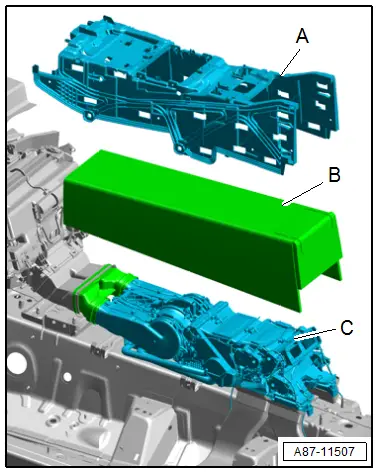
- Label the connector -A- and the actuator -C- (to avoid a mix up in case several connectors are disconnected at the same time).
- Disconnect the connector -A-.
- Remove the bolts -B-.
- Remove the actuator -C- from the relay lever -D-.
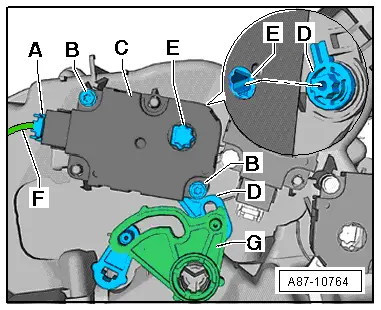
Installing
Install in reverse order of removal. Note the following:
 Caution
Caution
- If the actuator mount -E- is turned by hand when the connector -A- is disconnected, the electronics in the actuator can be damaged.
- Only turn the adjustment motor mount -E- carefully and slowly with connector -A- connected as far as needed for installation.
 Note
Note
- The mount of adjustment motor -E- can only be installed in one position on actuating arm -D-. If the adjustment motor mount -E- is positioned such that it cannot be joined with actuating arm -D-, the mount in adjustment motor -E- may need to be carefully turned with a suitable screwdriver until the two parts can be joined without force.
- If the mount of adjustment motor -E- is not in the illustrated position (the connecting piece can only be installed in this position), install connector -A- on the adjustment motor and turn the mount of adjustment motor -E- carefully to the position in which the two parts can be joined without pre-tension.
- The mount of adjustment motor -E- does not have a stop. It turns continuously if the adjustment motor is activated. Therefore, this should not be activated with the adjustment motor removed.
- Check actuating arm -D- and the mount of adjustment motor -E-. They must be properly aligned so that they can be joined.
- Ensure that the actuating arm -D- and curved washer -D- are in the correct installation position.
- Install the mount of adjustment motor -E- on actuating arm -D-.
- Check the connection between adjustment motor -E- and actuating arm -D-. There must be no play.
- Tighten the bolts -B-.
- Connect the connector -A-.
- Install wiring harness -F- so that it cannot come in contact with any moving parts.
- Perform the basic setting and the output diagnostic test mode of the A/C system. Refer to Vehicle Diagnostic Tester in the "Guided Fault Finding" function.
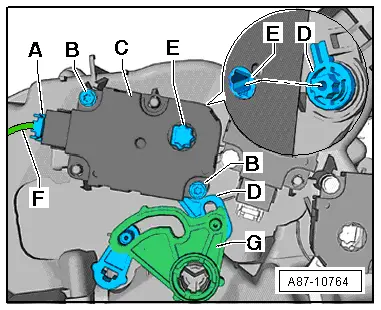
 Note
Note
- In this vehicle, the control motors are equipped with electronics. During the basic setting, a new control motor learns its position on the heater and A/C unit and can then be activated by the Rear A/C Display Control Head -E265- (currently all control motors are identical). Refer to Vehicle Diagnostic Tester in the "Guided Fault Finding" function.
- During the basic setting, the actuators are assigned and adapted corresponding to the switching sequence of the wiring. If this sequence does not conform with the specification, the actuators will adapt incorrectly and the door control will be wrong. Refer to → Chapter "Main Wiring Diagram for A/C System Actuators".
- Check the DTC memory on the Rear A/C Display Control Head -E265- and the Front A/C Display Control Head -E87-) and erase any malfunctions shown. Refer to Vehicle Diagnostic Tester in the "Guided Fault Finding" function.
Right Rear Temperature Control Door Motor -V314-, Removing and Installing
 Note
Note
- This adjustment motor is only installed in vehicles with a rear heater and A/C unit (not installed in vehicles with a rear air distribution housing).
- Currently in this vehicle, all actuators are identical in construction. During the basic setting, the actuators are assigned and adapted corresponding to the switching sequence of the wiring. If this sequence does not conform with the specification, the actuators will adapt incorrectly and the door control will be wrong. Refer to → Chapter "Main Wiring Diagram for A/C System Actuators".
- Therefore, perform the basic setting for the A/C system after installation of the adjustment motor. Refer to Vehicle Diagnostic Tester in the "Guided Fault Finding" function.
- Using the "output diagnostic test mode" and "basic setting" functions, the activation of A/C system electrical components can be tested if necessary (for example, allocation test). Refer to Vehicle Diagnostic Tester in the "Guided Fault Finding" function.
- After installing a new control motor, check the activation via the Rear A/C Display Control Head -E265- and the function of the control motor. Refer to Vehicle Diagnostic Tester in the "Guided Fault Finding" function.
- For this adjustment motor to be removed, the entire center console including the base carrier -A- of the center console installed between the base carrier and the rear heater and A/C unit -C- insulation -B- must be removed. Refer to → Body Interior; Rep. Gr.68; Center Console; Overview - Center Console.
Removing
- Remove the front passenger seat. Refer to → Body Interior; Rep. Gr.72; Front Seats; Front Seat, Removing and Installing.
- Turn off the ignition.
- Remove the base support -A- of center console and insulation -B-. Refer to → Body Interior; Rep. Gr.68; Center Console; Center Console Bracket, Removing and Installing.
 Caution
Caution
A/C system malfunctions in the case of interchanged control motors and/or connectors. Refer to → Chapter "Main Wiring Diagram for A/C System Actuators".
- The adjustment motors and connectors are identical. If they are installed or connected incorrectly, the corresponding doors cannot be properly adapted and/or activated.
- Clearly label the actuators and connectors prior to removal to prevent incorrect installation.
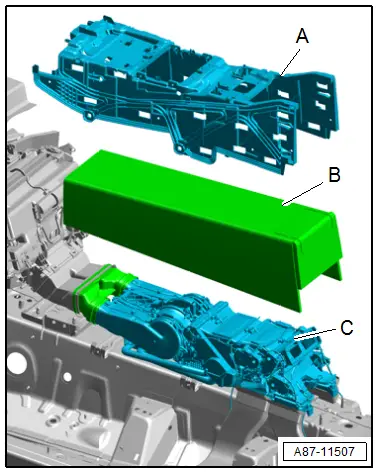
- Label the connector -A- and the actuator -C- (to avoid a mix up in case several connectors are disconnected at the same time).
- Disconnect the connector -A-.
- Remove the bolts -B-.
- Remove the actuator -C- from the relay lever -D-.
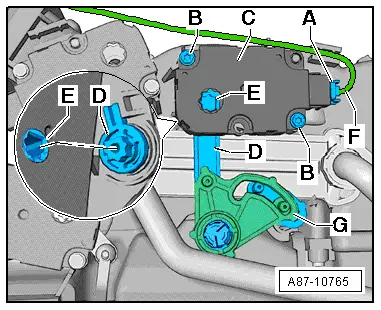
Installing
Install in reverse order of removal. Note the following:
 Caution
Caution
- If the actuator mount -E- is turned by hand when the connector -A- is disconnected, the electronics in the actuator can be damaged.
- Only turn the adjustment motor mount -E- carefully and slowly with connector -A- connected as far as needed for installation.
 Note
Note
- The mount of adjustment motor -E- can only be installed in one position on actuating arm -D-. If the adjustment motor mount -E- is positioned such that it cannot be joined with actuating arm -D-, the mount in adjustment motor -E- may need to be carefully turned with a suitable screwdriver until the two parts can be joined without force.
- If the mount of adjustment motor -E- is not in the illustrated position (the connecting piece can only be installed in this position), install connector -A- on the adjustment motor and turn the mount of adjustment motor -E- carefully to the position in which the two parts can be joined without pre-tension.
- The mount of adjustment motor -E- does not have a stop. It turns continuously if the adjustment motor is activated. Therefore, this should not be activated with the adjustment motor removed.
- Check actuating arm -D- and the mount of adjustment motor -E-. They must be properly aligned so that they can be joined.
- Ensure that actuating arm -D- and curved washer -G- are in the correct installation position.
- Install the mount of adjustment motor -E- on actuating arm -D-.
- Check the connection between adjustment motor -E- and actuating arm -D-. There must be no play.
- Tighten the bolts -B-.
- Connect the connector -A-.
- Install wiring harness -F- so that it cannot come in contact with any moving parts.
- Perform the basic setting and the output diagnostic test mode of the A/C system. Refer to Vehicle Diagnostic Tester in the "Guided Fault Finding" function.
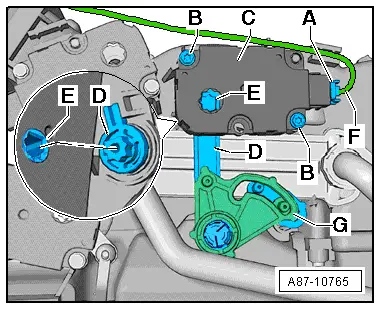
 Note
Note
- In this vehicle, the control motors are equipped with electronics. During the basic setting, a new control motor learns its position on the heater and A/C unit and can then be activated by the Rear A/C Display Control Head -E265- (currently all control motors are identical). Refer to Vehicle Diagnostic Tester in the "Guided Fault Finding" function.
- During the basic setting, the actuators are assigned and adapted corresponding to the switching sequence of the wiring. If this sequence does not conform with the specification, the actuators will adapt incorrectly and the door control will be wrong. Refer to → Chapter "Main Wiring Diagram for A/C System Actuators".
- Check the DTC memory on the Rear A/C Display Control Head -E265- and the Front A/C Display Control Head -E87-) and erase any malfunctions shown. Refer to Vehicle Diagnostic Tester in the "Guided Fault Finding" function.
Left Rear Upper Body Vent Motor -V315-
 Note
Note
- Depending on vehicle equipment, there are different versions of the A/C system for the Audi Q7. Make sure to use the correct version and pay attention to the allocation of different components. Refer to → Chapter "A/C System Versions" and Parts Catalog.
- Currently in this vehicle, all actuators are identical in construction. During the basic setting, the actuators are assigned and adapted corresponding to the switching sequence of the wiring. If this sequence does not conform with the specification, the actuators will adapt incorrectly and the door control will be wrong. Refer to → Chapter "Main Wiring Diagram for A/C System Actuators".
- Therefore, perform the basic setting for the A/C system after installation of the adjustment motor. Refer to Vehicle Diagnostic Tester in the "Guided Fault Finding" function.
- Using the "output diagnostic test mode" and "basic setting" functions, the activation of A/C system electrical components can be tested if necessary (for example, allocation test). Refer to Vehicle Diagnostic Tester in the "Guided Fault Finding" function.
- After the installing a new actuator, check the activation through the Rear A/C Display Control Head -E265- (in vehicles with a "High" A/C system) or through the Front A/C Display Control Head -E87- (in vehicles with a "Mid" or "Mix" A/C system) and the actuator function. Refer to Vehicle Diagnostic Tester in the "Guided Fault Finding" function.
- For this adjustment motor to be removed, the entire center console including the base carrier -A- of the center console installed between the base carrier and the rear heater and A/C unit / rear air distribution housing -C- installed insulation -B- must be removed. Refer to → Body Interior; Rep. Gr.68; Center Console; Overview - Center Console.
Removing
- Remove the driver seat. Refer to → Body Interior; Rep. Gr.72; Front Seats; Front Seat, Removing and Installing.
- Turn off the ignition.
- Remove the base support -A- of center console and insulation -B-. Refer to → Body Interior; Rep. Gr.68; Center Console; Center Console Bracket, Removing and Installing.
 Caution
Caution
A/C system malfunctions in the case of interchanged control motors and/or connectors. Refer to → Chapter "Main Wiring Diagram for A/C System Actuators".
- The adjustment motors and connectors are identical. If they are installed or connected incorrectly, the corresponding doors cannot be properly adapted and/or activated.
- Clearly label the actuators and connectors prior to removal to prevent incorrect installation.
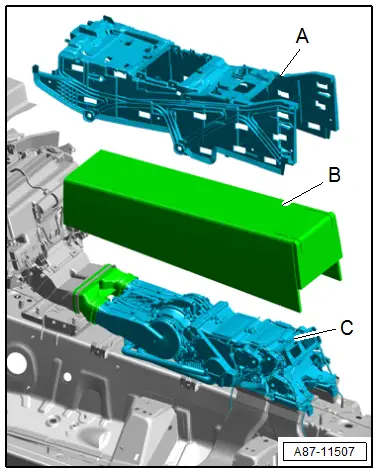
- Label the connector -A- and the actuator -C- (to avoid a mix up in case several connectors are disconnected at the same time).
- Disconnect the connector -A-.
- Remove the bolts -B-.
- Remove the adjustment motor -C- from the fastener -D-.
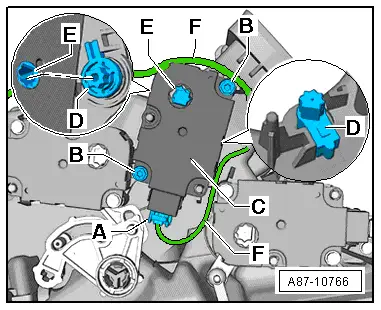
Installing
Install in reverse order of removal. Note the following:
 Caution
Caution
- If the actuator mount -E- is turned by hand when the connector -A- is disconnected, the electronics in the actuator can be damaged.
- Only turn the adjustment motor mount -E- carefully and slowly with connector -A- connected as far as needed for installation.
 Note
Note
- The mount of adjustment motor -E- can only be installed in one position on actuating arm -D-. If the adjustment motor mount -E- is positioned such that it cannot be joined with actuating arm -D-, the mount in adjustment motor -E- may need to be carefully turned with a suitable screwdriver until the two parts can be joined without force.
- If the mount of adjustment motor -E- is not in the illustrated position (the connecting piece can only be installed in this position), install connector -A- on the adjustment motor and turn the mount of adjustment motor -E- carefully to the position in which the two parts can be joined without pre-tension.
- The mount of adjustment motor -E- does not have a stop. It turns continuously if the adjustment motor is activated. Therefore, this should not be activated with the adjustment motor removed.
- Check the fastener -D- and the adjustment motor mount -E-. They must be properly aligned so that they can be joined.
- Ensure that the fastener -D- is in the correct installation position.
- Install the adjustment motor mount -E- onto the fastener -D-.
- Check the connection between the adjustment motor -E- and the fastener -D-. There must be no play.
- Tighten the bolts -B-.
- Connect the connector -A-.
- Install wiring harness -F- so that it cannot come in contact with any moving parts.
- Perform the basic setting and the output diagnostic test mode of the A/C system. Refer to Vehicle Diagnostic Tester in the "Guided Fault Finding" function.
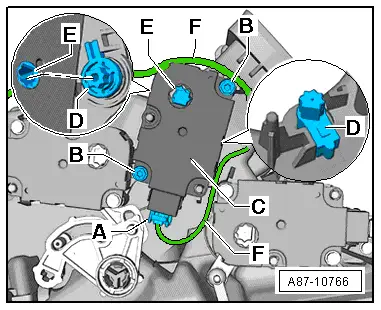
 Note
Note
- In this vehicle, the actuators are equipped with electronics. During the basic setting, a new actuator learns its position on the heater and A/C unit and can then be activated by the Rear A/C Display Control Head -E265- / the Front A/C Display Control Head -E87- (currently all actuators are identical). Refer to Vehicle Diagnostic Tester in the "Guided Fault Finding" function.
- During the basic setting, the actuators are assigned and adapted corresponding to the switching sequence of the wiring. If this sequence does not conform with the specification, the actuators will adapt incorrectly and the door control will be wrong. Refer to → Chapter "Main Wiring Diagram for A/C System Actuators".
- Check the DTC memory on the Rear A/C Display Control Head -E265- and the Front A/C Display Control Head -E87-) and erase any malfunctions shown. Refer to Vehicle Diagnostic Tester in the "Guided Fault Finding" function.
Right Rear Upper Body Vent Motor -V316-
 Note
Note
- Depending on vehicle equipment, there are different versions of the A/C system for the Audi Q7. Make sure to use the correct version and pay attention to the allocation of different components. Refer to → Chapter "A/C System Versions" and Parts Catalog.
- Currently in this vehicle, all actuators are identical in construction. During the basic setting, the actuators are assigned and adapted corresponding to the switching sequence of the wiring. If this sequence does not conform with the specification, the actuators will adapt incorrectly and the door control will be wrong. Refer to → Chapter "Main Wiring Diagram for A/C System Actuators".
- Therefore, perform the basic setting for the A/C system after installation of the adjustment motor. Refer to Vehicle Diagnostic Tester in the "Guided Fault Finding" function.
- Using the "output diagnostic test mode" and "basic setting" functions, the activation of A/C system electrical components can be tested if necessary (for example, allocation test). Refer to Vehicle Diagnostic Tester in the "Guided Fault Finding" function.
- After the installing a new actuator, check the activation through the Rear A/C Display Control Head -E265- (in vehicles with a "High" A/C system) or through the Front A/C Display Control Head -E87- (in a vehicle with a "Mix" or a "Mid" A/C system) and the actuator function. Refer to Vehicle Diagnostic Tester in the "Guided Fault Finding" function.
- For this adjustment motor to be removed, the entire center console including the base carrier -A- of the center console installed between the base carrier and the rear heater and A/C unit/ rear air distribution housing -C- installed insulation -B- must be removed. Refer to → Body Interior; Rep. Gr.68; Center Console; Overview - Center Console.
Removing
- Remove the front passenger seat. Refer to → Body Interior; Rep. Gr.72; Front Seats; Front Seat, Removing and Installing.
- Turn off the ignition.
- Remove the base support -A- of center console and insulation -B-. Refer to → Body Interior; Rep. Gr.68; Center Console; Center Console Bracket, Removing and Installing.
 Caution
Caution
A/C system malfunctions in the case of interchanged control motors and/or connectors. Refer to → Chapter "Main Wiring Diagram for A/C System Actuators".
- The adjustment motors and connectors are identical. If they are installed or connected incorrectly, the corresponding doors cannot be properly adapted and/or activated.
- Clearly label the actuators and connectors prior to removal to prevent incorrect installation.
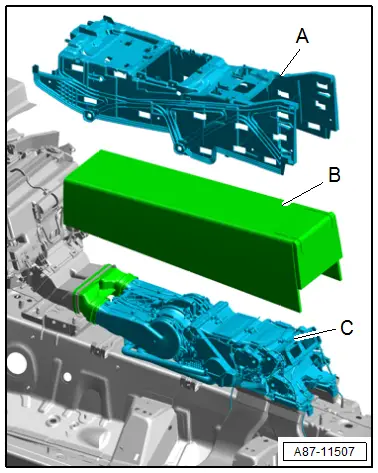
- Label the connector -A- and the actuator -C- (to avoid a mix up in case several connectors are disconnected at the same time).
- Disconnect the connector -A-.
- Remove the bolts -B-.
- Remove the adjustment motor -C- from the fastener -D-.
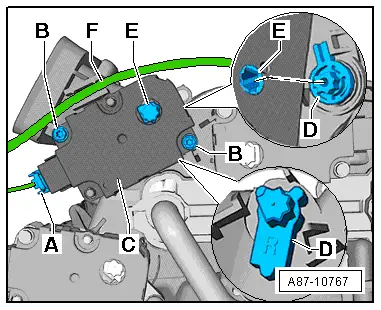
Installing
Install in reverse order of removal. Note the following:
 Caution
Caution
- If the actuator mount -E- is turned by hand when the connector -A- is disconnected, the electronics in the actuator can be damaged.
- Only turn the adjustment motor mount -E- carefully and slowly with connector -A- connected as far as needed for installation.
 Note
Note
- The mount of control motor -E- can only be installed in one position on fastener -D-. If the adjustment motor mount -E- is positioned such that it cannot be joined with the fastener -D-, the mount in adjustment motor -E- may need to be carefully turned with a suitable screwdriver until the two parts can be joined without force.
- If the mount of adjustment motor -E- is not in the illustrated position (the connecting piece can only be installed in this position), install connector -A- on the adjustment motor and turn the mount of adjustment motor -E- carefully to the position in which the two parts can be joined without pre-tension.
- The mount of adjustment motor -E- does not have a stop. It turns continuously if the adjustment motor is activated. Therefore, this should not be activated with the adjustment motor removed.
- Check the fastener -D- and the adjustment motor mount -E-. They must be properly aligned so that they can be joined.
- Ensure that the fastener -D- is in the correct installation position.
- Install the adjustment motor mount -E- onto the fastener -D-.
- Check the connection between the adjustment motor -E- and the fastener -D-. There must be no play.
- Tighten the bolts -B-.
- Connect the connector -A-.
- Install wiring harness -F- so that it cannot come in contact with any moving parts.
- Perform the basic setting and the output diagnostic test mode of the A/C system. Refer to Vehicle Diagnostic Tester in the "Guided Fault Finding" function.
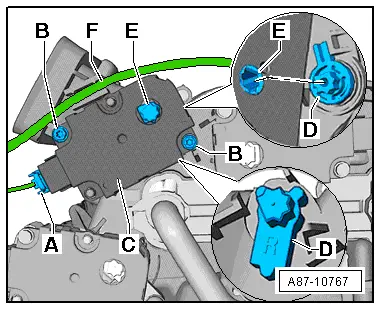
 Note
Note
- In this vehicle, the actuators are equipped with electronics. During the basic setting, a new actuator learns its position on the heater and A/C unit and can then be activated by the Rear A/C Display Control Head -E265- / the Front A/C Display Control Head -E87- (currently all actuators are identical). Refer to Vehicle Diagnostic Tester in the "Guided Fault Finding" function.
- During the basic setting, the actuators are assigned and adapted corresponding to the switching sequence of the wiring. If this sequence does not conform with the specification, the actuators will adapt incorrectly and the door control will be wrong. Refer to → Chapter "Main Wiring Diagram for A/C System Actuators".
- Check the DTC memory on the Rear A/C Display Control Head -E265- and the Front A/C Display Control Head -E87-) and erase any malfunctions shown. Refer to Vehicle Diagnostic Tester in the "Guided Fault Finding" function.

